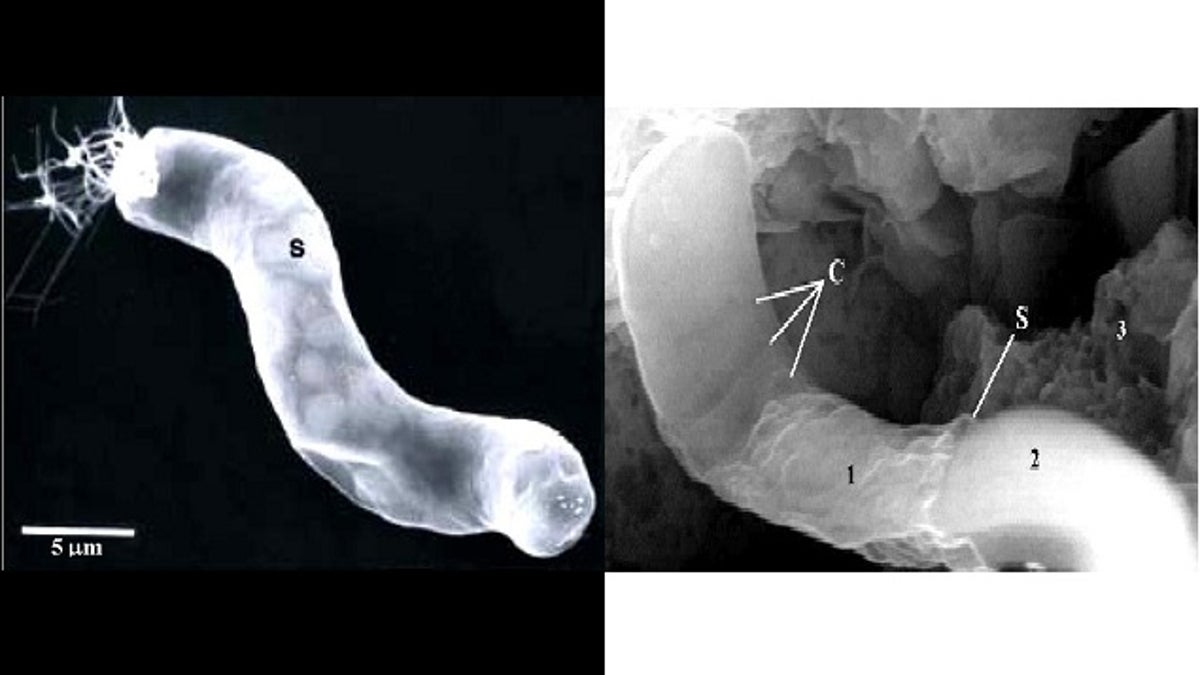
A photograph taken through a scanning electron microscope of a CI1 meteorite (right) is similar in size and overall structure to the giant bacterium Titanospirillum velox (left), an organism found here on planet Earth, a NASA scientist said. (Riccardo Guerrero / Richard B. Hoover / Journal of Cosmology)
A NASA scientist announced a shocking find Friday, claiming a rare meteorite holds the fossilized evidence of alien life.
But is the work a "remarkable achievement," as one scientist put it? Or in the words of another, simply "garbage"?
Dr. Richard B. Hoover, an astrobiologist with NASA’s Marshall Space Flight Center, is convinced that he has found fossils within an extremely rare class of meteorites, called CI1 carbonaceous chondrites. He published his latest findings in the March edition of the online Journal of Cosmology -- research that suggests we are not alone in the universe, he told FoxNews.com.
“I interpret it as indicating that life is more broadly distributed than restricted strictly to the planet Earth,” Hoover said. “This field of study has just barely been touched -- because quite frankly, a great many scientist would say that this is impossible.”
Expecting controversy, the journal issued personal invitations to 100 scientists asking them to weigh in on the finding.
Now the journal itself has become the source of controversy.
On Monday, a NASA statement by Paul Hertz, chief scientist in the science division, said Hoover failed to advise the agency he had submitted the paper to the Journal of Cosmology -- and that the article failed to get published in a more established peer-reviewed journal.
Others point to a history of "out there" science stories, and note that the Journal's website is amateurish. Blogger and University of Minnesota-Morris biologist P.Z. Myers called it "the ginned-up website of a small group of crank academics."
"This work is garbage," he said. "I'm surprised anyone is granting it any credibility at all."
Editor Lana Tao recently fought back, calling such comments "tantamount to school-yard taunts by jealous children."
"The ad hominem attacks and complaints by those [that] say Dr. Hoover's article should have been published in these other periodicals, and not JOC, are just sour grapes and should not be taken seriously," she Tao said.
The Journal published early Monday morning 12 responses, said Dr. Rudy Schild, a scientist with the Harvard-Smithsonian's Center for Astrophysics and Cosmology's editor-in-chief.
He claimed that "no commentary has pointed out any major flaws in the data." Many scientists have indeed voiced concerns, however, just not to the Journal itself -- despite the open call for discussion.
David Morrison, senior scientist at the NASA Astrobiology Institute at Ames Research Center, told MSNBC he felt the choice of scientific journal was enough to call the report into question.
"Extraordinary claims require extraordinary evidence. At a bare minimum this would require publication in a prestigious peer-refereed scientific journal -- which this is not."
"Perhaps the publication came out too soon; more appropriate would have been on April 1," Morrison added.
The commentary posted to the Journal of Cosmology's site is more measured. It tends to be enthusiastic and open-minded, often suggesting other interpretations and calling for additional work to verify Hoover's findings:
Many scientists and writers have referenced the earlier work in this field, and similar claims of life in meteorites -- both the 1960s claims by Fordham University chemist Bartholomew Nagy as well as earlier claims by Dr. Hoover made in 2004 and 2007.
NASA science chief Hertz seconded those statements.
"While we value the free exchange of ideas, data, and information as part of scientific and technical inquiry, NASA cannot stand behind or support a scientific claim unless it has been peer-reviewed or thoroughly examined by other qualified experts," Mr Hertz said.
